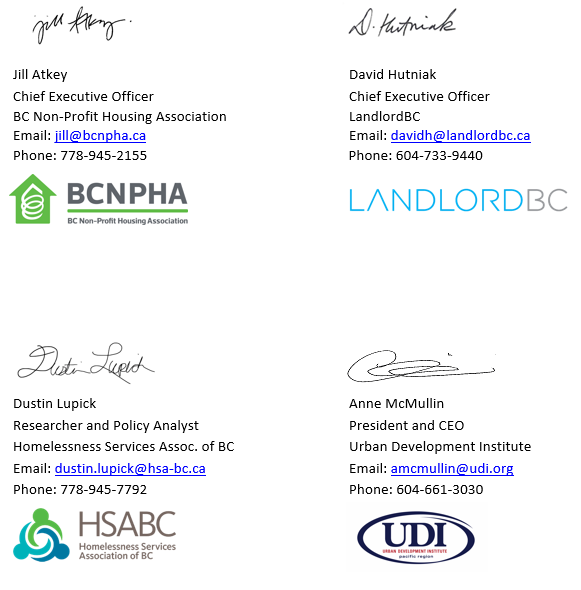Signatories: BC Non-Profit Housing Association, LandlordBC, Homelessness Services Association of BC, and Urban Development Institute
FOR IMMEDIATE RELEASE
April 26, 2019
Over the past few weeks, the issue of the Provincial Government’s intent to establish a new temporary modular housing development in the municipality of Maple Ridge, and elected officials’ statements of opposition to it, have been at the forefront of media and public attention.
Homelessness touches every corner of our province, and each level of government has a role to play alongside community partners to ensure that all citizens are safely and affordably housed. Language that is inflammatory and discriminatory contributes to an ongoing, negative stigma of people experiencing homelessness that distracts us from finding solutions. And solutions are within our reach for the first time in a generation.
We applaud the significant housing investments made by the Province of British Columbia since 2015. These investments include a range of temporary and permanent supportive housing units for people experiencing homelessness, community housing for families and seniors, Indigenous housing, housing for women and children leaving violence, student housing, and housing for middle-income earners.
For many years, citizens, mayors, and councils from across the province have been asking investments in housing, and senior levels of government are now making historic investments into affordable housing. Municipalities willing to work as partners with the community housing sector and other levels of government will see the impacts of these investments for generations to come, because what is affordable in the community housing sector today, remains affordable tomorrow.
Compassion defines the work of the community housing sector, but facts also drive the work that our sector does. And the facts speak for themselves: the reality is that of the 124 individuals who identified as experiencing homelessness in Ridge Meadows in the 2017 Metro Vancouver Homeless Count, 60% of them have lived in the community for 10 or more years.[1] In addition, a wealth of academic evidence shows that supportive housing is necessary for stabilizing the lives of vulnerable tenants who, frequently, have histories of complex trauma, violence, and abuse.[2]
On balance, properly managed supportive housing buildings show no direct correlation to increased crime, lowered property values, or safety issues compared to any other form of housing.
Moreover, supportive housing saves taxpayer’s money by ensuring people experiencing homelessness are not sheltered by expensive emergency services like hospitals.
Focusing on solutions and partnerships rather than discriminatory rhetoric will help to ensure that all British Columbians have access to safe and affordable housing, regardless of which community they call home.
For more information or to arrange a media interview, please contact:
Dean Pogas
604.363.6590
dean@bcnpha.ca
[1]2017 Metro Vancouver Homeless Count: Ridge Meadows Policy Brief. Found at: https://stophomelessness.ca/wp-content/uploads/2017/10/2017_HomelessCount-RidgeMeadowsPolicyBrief.pdf
[1] Four examples of this literature include: Dennis P. Culhane, Stephen Metraux, and Trevor Hadley “Public Service Reductions Associated with Placement of Homeless Persons with Severe Mental Illness in Supportive Housing.” Housing Policy Debate Vol. 13 No.1 (2002): 107-63; Martinez, and Burt. “Impact of Permanent Supportive Housing on the Use of Acute Care Health Services by Homeless Adults.” Psychiatric Services Vol. 57 No.7 (2006): 992-99; New York City Department of Health and Mental Hygiene. “New York/New York III Supportive Housing Evaluation: Interim Utilization and Cost Analysis” (2013); Paula Goering, Scott Veldhuizen, Aimee Watson, Carol Adair, Brianna Kopp, Eric Latimer, Geoff Nelson, Eric MacNaughton, David Streine & Tim Aubry (2014). National At Home/Chez Soi Final Report. Calgary, AB: Mental Health Commission of Canada.
